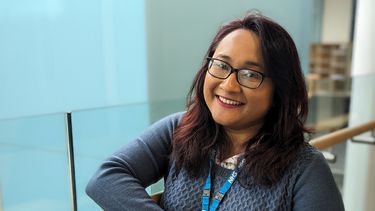Your support is fuelling world-class Parkinson's disease research
Your gifts inspire our dedicated researchers to persevere and stay focused on finding new treatments for devastating diseases like Parkinson’s.

Sheffield feels like home now. It is a lovely city to live in. I think what makes Sheffield so special is its people. The respect and admiration I receive here is invaluable and inspires me to do good work.”
Mahjabin Islam
Clinical Research Fellow
Meet Mahjabin Islam. She's a Clinical Research Fellow at the Sheffield Institute for Translational Neuroscience (SITraN). Mahjabin’s PhD Fellowship was made possible thanks to the generosity of hundreds of supporters.
Her research explores the gut-brain interaction in Parkinson's disease patients, with a view to identifying metabolites and/or microbes that could be targeted for new therapies.
We asked Mahjabin about her specialism, what she enjoys most about working at Sheffield's world-leading neuroscience facility, and about the impact your generosity has had on her research:
What makes Sheffield, and particularly SITraN so special?
It’s a privilege to be working in SITraN. To make progress in research, a supportive academic environment is an absolute must and SITraN is one of the best centres for neuroscience research. We have world-leading professors running cutting-edge clinical research, fantastic training opportunities and a large patient pool very engaged in research. My area of interest is neurodegenerative conditions and as an early career researcher, having experts like Professor Bandmann and Professor Dame Shaw, so close by and on hand is incredibly motivating.”
Tell us about your specific research area. What are you trying to accomplish?
While working as a neurology specialty trainee in Sheffield, I have been struck by the devastating consequences for those living with progressive neurodegenerative conditions like Parkinson's disease. Although there are symptomatic treatments, there is a lack of disease-modifying treatment available to help these patients, which has driven my interest in research on this condition.
With this PhD fellowship, I aim to explore the gut-brain interaction in Parkinson's disease patients, with a view to identifying metabolites and/or microbes that could be targeted in new therapies.
One such neuroprotective hormone is called GLP-1. This is released from the gut tissues in response to food intake, but recent studies suggest this is triggered by some of the specialised neurons in the brain. This hormone helps with reducing cell death and improved neuronal survival. Our aim is to explore if GLP-1 release is impaired in patients with Parkinson’s disease compared to age- and sex-matched controls.
I will explore whether microbes in the gut can alter bile acid pool composition which results in impaired GLP-1 secretion in Parkinson’s patients, and whether this is restored by treatment with ursodeoxycholic acid (UDCA).
We will recruit patients and healthy controls to compare our results. We will determine their bile acid, GLP-1 level in fasting state and after a meal. For the patient group we will assess if there is any change in GLP-1 release after they take a treatment dose UDCA. We will compare the UDCA response of GLP-1 secretion to changes in the microbiome and metabolome.
My ultimate aim is to focus my research to develop disease-modifying therapies for Parkinson’s disease.”
Why is funding research so important?
I think about this a lot. When I donate to a cause, I try to donate in a place where it will have the most impact. I understand that this is what people expect from us too. Here at SITraN the research that we do, from understanding the biology of a disease process to running clinical trials, translates to meaningful results in clinical practice.
By supporting neuroscience research at Sheffield, you can help fund vital research projects, provide resources for researchers, and help train the next generation of neuroscientists. Their contribution makes a significant impact in improving the lives of those affected by neurological disorders.
Funding research ensures, a group of young, motivated researchers, like me, can perform cutting edge research with the supervision of world-leading experts in specialised facilities like SITraN.”
What motivates you and keeps you focused when things aren’t going to plan?
I believe in science every question has an answer, there is a right time to get the answer. If I don’t find the answer now, that does not mean the question is wrong, it means, I need to take a step back, reassess and then put in more effort to get the answer.
I always remember someone once said to me, ‘There will always be new diseases, but diseases will not win because there will always be research to out-power them and people like you will do this research.’ If I am stuck, I remember these words.”
What would you say to anyone that had donated towards Parkinson’s disease research or medical research at Sheffield?
I am very grateful to them. Their generosity and support has made a significant impact in advancing research and finding better treatments for Parkinson's disease and other medical conditions. Their donation has helped improve the lives of those who are affected by Parkinson's disease and their families, and help us move closer to finding a cure or at least stall the progression. Thank you for your contribution towards this important cause.”
